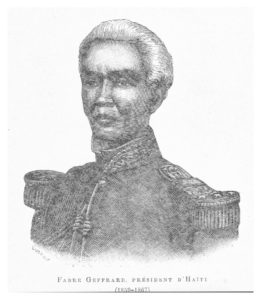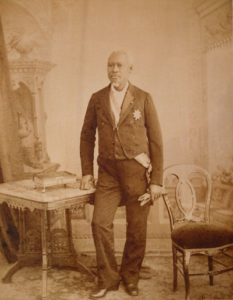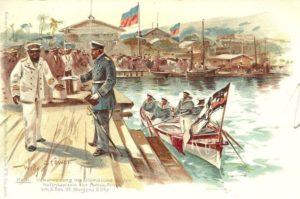The sufferings endured by the soldiers during the campaign of 1855, and the losses and sacrifices inflicted on the country without yielding any compensation or any practical results provoked great discontent. In 1858 a revolution began, led by General Fabre Geffrard, Duke of Tabara.

In December of that year, Geffrard defeated the Imperial Army and seized control of most of the country. As a result, the Emperor abdicated his throne on 15 January 1859. Refused aid by the French Legation, Faustin was taken into exile aboard a British warship on 22 January 1859, and General Geffrard succeeded him as President.
Late 19th Century–Early 20th Century:
The period following Soulouque’s overthrow down to the turn of the century was a turbulent one for Haiti, with repeated bouts of political instability. President Geffrard was overthrown in a coup in 1867, as was his successor, Sylvain Salnave, in 1869. Under the Presidency of Michel Domingue (1874–76) relations with the Dominican Republic were dramatically improved by the signing of a treaty, in which both parties acknowledged the independence of the other, bringing an end to Haitian dreams of bringing the entirety of Hispaniola under their control. Some modernization of the economy and infrastructure also occurred in this period, especially under the Presidencies of Lysius Salomon (1879–88) and Florvil Hyppolite (1889–96).

Haiti’s relations with outside powers were often strained. In 1889 the United States attempted to force Haiti to permit the building of a naval base at Môle Saint-Nicolas, which was firmly resisted by President Hyppolite. In 1892 the German government supported suppression of the reform movement of Anténor Firmin, and in 1897, the Germans used gunboat diplomacy to intimidate and then humiliate the Haitian government of President Tirésias Simon Sam (1896–1902) during the Lüders Affair.

In the first decades of the 20th century, Haiti experienced great political instability and was heavily in debt to France, Germany and the United States. A series of short lived presidencies came and went: President Pierre Nord Alexis was forced from power in 1908, as was his successor François C. Antoine Simon in 1911; President Cincinnatus Leconte (1911–12) was killed in a (possibly deliberate) explosion at the National Palace; Michel Oreste (1913–14) was ousted in a coup, as was his successor Oreste Zamor in 1914.
United States Occupation (1915–1934):
Germany increased its influence in Haiti in this period, with a small community of German settlers wielding disproportionate influence in Haiti’s economy. The German influence prompted anxieties in the United States, who had also invested heavily in the country, and whose government defended their right to oppose foreign interference in the Americas under the Monroe Doctrine. In December 1914, the Americans removed $500,000 from the Haitian National Bank, but rather than seize it to help pay the debt, it was removed for safe-keeping in New York, thus giving the United States control of the bank and preventing other powers from doing so. This gave a stable financial base on which to build the economy, and so enable the debt to be repaid.
